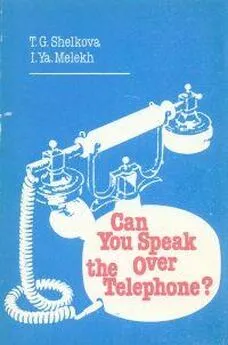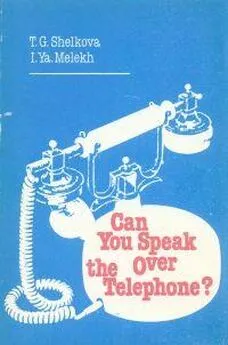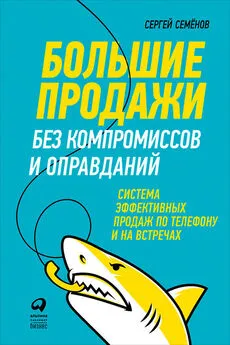Т. Шелкова - Как вести беседу по телефону
- Название:Как вести беседу по телефону
- Автор:
- Жанр:
- Издательство:Высшая школа
- Год:1989
- Город:М.
- ISBN:5-06-001624-2
- Рейтинг:
- Избранное:Добавить в избранное
-
Отзывы:
-
Ваша оценка:
Т. Шелкова - Как вести беседу по телефону краткое содержание
Ведение разговора по телефону на иностранном языке требует от обучающегося определенных навыков понимания, восприятия и удержания в памяти услышанного, а также незамедлительной словесной реакции на услышанное. Недостаточное развитие этих навыков является препятствием к тому, чтобы хорошо и уверенно говорить по телефону.
Пособие ставит своей целью помочь учащимся овладеть навыками беседы по телефону, пользоваться общепринятой терминологией.
Во второе издание (1-е — 1980 г.) внесены исправления редакционного характера.
Для лиц, самостоятельно совершенствующих свои знания английского языка.
Как вести беседу по телефону - читать онлайн бесплатно полную версию (весь текст целиком)
Интервал:
Закладка:
IV. Make up telephone conversations considering these assignments.
1. Brown amp; Co. for some reason or other have not delivered the goods in the stipulated time. Phone the Company and let them know that they are responsible for the delay and have either to make emergency delivery within a week or to pay you a penalty.
2. You are decorating your apartment. The work is progressing very slowly. Phone the manager of the Company and ask him to offer his workmen a spot of overtime over the week-end so that they could finish off all the outstanding work within two days.
3. You’ve been up to your ears in work over the past two weeks and failed to send a book on Soviet art to your colleague. Phone him, offer your apologies and say that you do remember your promise and that you will get the book in the post this afternoon.
В. INFORMAL TELEPHONE COVERSATIONS
Charles: Two-six-two four-three-double four. Charles Farmer speaking.
Joan: Hello, Charles, it’s Joan — Joan Cook.
Charles: Hello, Joan, how are you?
Joan: I’m very well, thanks [59] I’m very well, thanks : a slightly formal reply to the question “How are you?” than either ‘Tine, thanks” or “Oh, not so bad; you know”.
. How are you?
Charles: Oh, not so bad, you know.
Joan: Good. I rang to ask if you know anything about hotels in Brighton.
Charles: No, I’m afraid [60] I’m afraid : a common conversational way of introducing an apologetic note into what is being said
I can’t be very much help to you there [61] there : in that respect
.
Joan: Well, it’s just that we’ve been thinking of taking the family to the south this summer and at this rather late stage we’re trying to organize [62] organise : note this colloquial use of “organise” to mean “get, obtain” (by means of some kind of planning); e.g. “I feel hungry — I’m going to organise a sandwich for myself.”
ourselves a suitable hotel. But I thought that you’d been to Brighton;
Charles: I have. Several times. But I’ve always taken a tent and done it the hard way [63] to do smth. the hard way : to have difficulties to overcome; e. g. ‘The manager came up the hard way — he started as an errand boy.”
.
Joan: Oh, I see. I didn’t realize that.
Charles: Yes. Great one for the open air [64] Great one for the open air : I have a strong liking for the open air. The phrase “a great one for” is sometimes used to indicate strong preferences, as in “Jimmy’s a great one for football”, etc. there often seems to be some humorous intent when the phrase is used.
, you know.
Joan: Oh, it must be nice, but we could never contemplate it with our lot [65] our lot : our family
. We’re terribly disorganized as a family, you know, and we’d be in chaos in no time. And in any case the car isn’t big enough to get all of us in and camping equipment as well, so we simply must find ourselves a nice hotel where they’ll put up with [66] put up with : toletate. Note the difference of meaning with “put up” to mean “accommodate”, as in “They’ll put up noisy kids in that hotel”.
noisy kids.
Charles: Mm. You have got a problem. And it’s certainly a bit late. But there are masses of adverts. Have you looked at those?
Joan: Well, yes. As a matter of fact I was reading one advert only this morning in the Sunday paper which sounded marvellous.
Charles: For a hotel?
Joan: Yes. Just outside Brighton. And I thought to myself “I’ll give Charles a ring [67] give Charles a ring : note the numerous verbs which have to do with making a telephone call. Some of these, beginning with the more formal and ending with the less formal ones are: ‘Telephone X, Ring X, Give X a ring, Give X a tinckle”.
. He may know it”.
Charles: Oh, dear I am a dead loss [68] a dead loss : someone or something completely useless
, aren’t I. But tell me about the advert.
Joan: It said that this hotel was right on the beach, and that’s essential as far as we’re concerned, because the kids are really only interested in scrabbling [69] scrabbling : combines the notions of crawling in and scratching about in (копаться, рыться)
in the sand and popping into [70] popping into : going into. The implication is that it would only be for a short time. “Pop in” is also used of an informal visit, e. g. “If you happen to be passing just pop in and see me, please”.
the sea every five minutes, so we must be close to it-the closer the better.
Charles: I know just how it is [71] I know just how it is : a phrase used to express concern and sympathetic understanding
.
Joan: And all the rooms have balconies facing the sea and overlooking the beach so it should be possible for mum and dad [72] mum and dad : the speaker’s way of referrring to herself and her husband
to keep half an eye on [73] keep half an eye on : pay some attention to
the kids while they’re playing and manage a quiet snooze at the same time occasionally.
Charles: Sounds too good to be true [74] too good to be true : a fixed phrase (так хорошо, что и не верится; невероятно)
. Expensive?
Joan: Rather. But still the prices were a bit lower than in any of the other adverts I’ve seen, and yet the facilities were as good or even better. You know, even allowing for [75] allowing for : taking into account
a bit of exaggeration in the advert, it seemed to have a lot to offer [76] a lot to offer : a fixed phrase often used for referring to something which has a number of desirable features
.
Charles: Had it?
Joan: Oh, yes. And the food is good — according to the advert, again — but they’re bound to say that.
Charles: Of course. The only way to find out for certain is to go and try it. And that’s taking rather a risk. I tell you what [77] I tell you what : a colloquial way of introducing a suggestion
, though. It’s just occurred to me — Mr and Mrs Croft from over the road [78] from over the road : the equivalent in less idiomatic English would be “who live on the other side of the road”
have been to that part of England several times, and I seem to remember them saying they always use the same hotel.
Joan: Do they?
Charles: Yes. At least I think that’s what they said. I’ll pop around [79] pop around : pop into
later this evening, and if they do know anything that might be of use to you I’ll get one or the other of them to give you a ring.
Joan: Would you? That’s very kind of you. They won’t mind, will they?
Charles: No, of course not. I’m sure they’ll be pleased to help.
Joan: Well, that’s marvellous.
Charles: Did you say something about taking the car?
Joan: Yes. It takes a little longer. But there is no need to rush, because Doug’s got an extra week’s holiday this year.
Charles: Lucky Doug. But isn’t it rather a long drive from Edinburgh — what with the children and the holiday traffic [80] what with the children and the holiday traffic : the sense here is that “because of the children and the holiday traffic” the length of the drive will be a problem. This use of “what with” to mean something like “because of, in view of is quite common in conversational English; e.g. “What with doing the housework and the shopping, I never have a moment to spare”.
?
Joan: Well, strange as it may seem, the kids are very good in the car. And if you go by train or air you don’t see much on the way, you’re sort of insulated from all the lovely places you’re passing.
Charles: Yes, I agree with you.
Joan: But I’m sure you must have better things to do than listen to me rattling on [81] rattling on : colloquial for “chattering”
.
Charles: Oh, that’s all right. It’s nice to hear from you. But I will drop in on the Crofts and ask them to phone you. Don’t expect to hear anything until after nine, though, because they’re usually out on Sunday until some time in the evening.
Joan: Well, I shall be around [82] around : at home; “around the house” meaning “in the house”
whatever time they ring. Busy getting things ready for school tomorrow. And thanks again, Charles. It really is very kind of you to go to all this trouble.
Charles: No trouble at all. Only too glad [83] only too glad : an expressive way of saying “glad”
to help if I can.
Joan: Well, thanks anyway. Bye-bye, Charles.
Charles: Bye for now, Joan.
Joe: Peatley two-seven-one [84] Peatley two-seven-one : although more and more telephone exchanges in Britain are being converted to all-figure numbers, some are still identified by a name
.
Bob: Hello, is that you, Joe?
Joe: Yes.
Bob: Bob here. How’s things? [85] How’s things : a colloquial variant of “How are you”
Joe: Oh, hello, Bob. Fine. How are you?
Bob: О. K. Listen, I’ve decided to apply for that job I was telling you about. You remember?
Joe: Yes. I remember. Croydon [86] Croydon : a suburb of London
, wasn’t it? What was it, a car factory?
Bob: No, light engineering. Rather like that place I was at in Leeds.
Joe: Oh yes, of course. Light engineering. I remember now. And it was for a manager, wasn’t it.
Bob: Yes. Personnel Manager.
Joe: Very nice too. Do you feel optimistic about it?
Bob: Well, I wouldn’t say I exactly feel optimistic, but at least my training and experience have put me in with a chance [87] put me in with a chance : given me a chance
. So perhaps I could say I feel reasonably optimistic about getting short-listed [88] short-listed : placed on the “short list” of people who are selected from all the other applicants and given an interview.
. But the interview — that’s different.
Joe: Why, for goodness sake? [89] for goodness sake : a mild exclamation often used to express varying degrees of exasperation
You’re not scared of interviews, are you?
Bob: No, I’m not scared of them, but I don’t feel at my best in interviews. Not when I’m on the receiving end [90] on the receiving end : in the position of receiving something
, that is. I suppose I spend so much of my time interviewing other people that I feel off balance when I’m in the hot seat [91] in the hot seat : a colloquial metaphor used of any uncomfortable situation
myself.
Joe: Oh, I shoudn’t worry too much about it if I were you [92] I shouldn’t worry too much about it if I were you : this sentence, or something very much like it, is used so often in these circumstances that it amounts almost to a fixed phrase
. As you say, the job is absolutely made for you. I shoudn’t think they’ll get many applicants with your qualifications [93] with your qualifications : the sense is that there are unlikely to be many applicants “with such good qualifications”, rather than “with the same qualifications”
.
Интервал:
Закладка:










